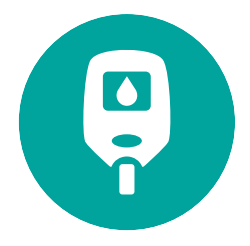Managing Swelling Caused by Kidney Disease

Whether it’s in your ankles, hands, or face, swelling caused by kidney disease is uncomfortable. It can make everyday activities like walking difficult and may lead to shortness of breath, chest pain, and stiffness.1 Even though it’s a common symptom for people living with kidney disease, learning how you can manage and sometimes avoid swelling can help reduce the discomfort that comes with it.
Understanding and Identifying Swelling Caused by Kidney Disease
Excess swelling—also known as edema—can be caused by your kidneys not being able to remove excess fluid from your body.1 For people with either chronic kidney disease (CKD) or end stage renal disease (ESRD), this can be a symptom of hypervolemia, when the body has too much fluid.
You can get an idea if you have edema by pressing a bony area on one of your lower limbs, like your foot, for 5 seconds. See the depth and length of time your finger imprint lasts in that spot. This is valuable information for your doctor because it can help them decide which treatment is best for you.
You can get an idea if you have edema by pressing a bony area on one of your lower limbs, like your foot, for 5 seconds. See the depth and length of time your finger imprint lasts in that spot. This is valuable information for your doctor because it can help them decide which treatment is best for you.
Edema grading scale




Four Ways to Prevent Kidney Disease Swelling
Making kidney-friendly lifestyle choices—such as eating well, taking the medications your doctor prescribes, and managing your fluid levels—may help you prevent swelling caused by kidney disease. Since your healthcare provider knows your medical history, they can tell you which lifestyle choices can benefit you the most and help you come up with a more detailed plan to avoid swelling. Ask them how the following tips can help you manage edema.
1. Avoid sodium
Sodium can cause fluid retention. Keeping it out of your diet can prevent excess fluid from building up in your body and also make you less thirsty. Avoid extra sodium by cooking your meals from scratch and shopping for fresh foods. Creating a grocery list before grocery shopping can also help you avoid foods with sodium.
2. Monitor blood pressure
High blood pressure may be an indication of excess fluid. Monitoring your blood pressure on a daily basis can help you stop edema before it happens. Talk to your care team about your ideal blood pressure and how to maintain it.
3. Weigh yourself daily
Gaining weight might mean your body has excess fluid, something you can monitor by weighing yourself daily. Get the most accurate number by doing this at the same time every day and wearing similar clothing. Record your weight each day so you can detect any change. Let your care team know if you do notice a rapid or drastic change—especially if you are also experiencing other symptoms like swelling or shortness of breath.
4. Decrease fluid intake
Decreasing your fluid intake can help you control your fluid levels. You can do this by eating frozen low-potassium fruits to quench your thirst. Try waiting 10 minutes for a fluid craving to pass. Lowering your sodium intake by choosing foods that have 10 percent or lower Daily Value of sodium which you can find on the Nutrition Facts label. Also, cooking with herbs and spices instead of salt can help reduce thirst and control fluid intake.
Learn ways to treat swelling
You can manage edema by following the treatments your doctor recommends. One of these treatments may be a prescription for a diuretic, also known as a water pill, which increases urine production and can help your kidneys remove the excess fluid in your body.
Dialysis is another treatment that can reduce swelling. If you’re already on dialysis, complete each session, which can help remove excess fluid and reducing your swelling. If you go on dialysis in the future, make sure you know how long each session should be and how frequently you need it. Sticking to your full treatment is very important to remove all excess fluid. Also, talk to your care team about eating well on dialysis and other kidney-friendly lifestyle choices that can help minimize and sometimes avoid this uncomfortable symptom of kidney disease.
Dialysis is another treatment that can reduce swelling. If you’re already on dialysis, complete each session, which can help remove excess fluid and reducing your swelling. If you go on dialysis in the future, make sure you know how long each session should be and how frequently you need it. Sticking to your full treatment is very important to remove all excess fluid. Also, talk to your care team about eating well on dialysis and other kidney-friendly lifestyle choices that can help minimize and sometimes avoid this uncomfortable symptom of kidney disease.
References
1 “Edema,” Mayo Clinic, last modified December 1, 2020, https://www.mayoclinic.org/diseases-conditions/edema/symptoms-causes/syc-20366493.
Suggested topics
Medications to Avoid or Adjust If You Have Chronic Kidney Disease
When your kidneys don’t function the way they should, prescription and over-the-counter medications can build up in your blood and may cause additional damage to your kidneys or other parts of your body...
Choosing Low Sodium Foods
Managing your sodium intake is an important part of looking after your health—especially if you’ve been diagnosed with chronic kidney...

Managing Blood Sugar and Chronic Kidney Disease
If you are living with diabetes and kidney disease, it is important to stay in control of your blood sugar so you can be your healthiest and avoid other...

Dialysis that fits into your life
Keep living the life you love while doing dialysis from the comfort of your home. Learn about the benefits of home dialysis.
Read more
